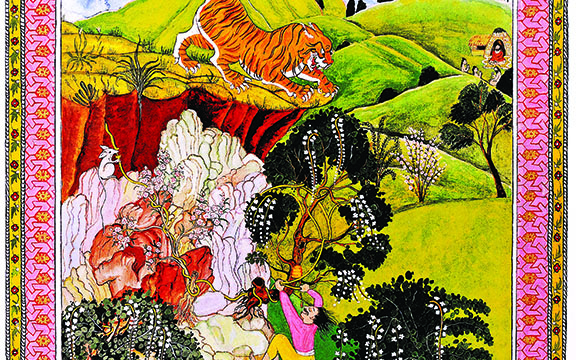 We try to use our limited, finite intelligence to understand, grasp things, and make our lives happy, aiming to achieve and acquire this or that. Yet, in the end, nothing seems to truly help. Sometimes, it may feel like we’re finding peace or happiness, but all these external things are fleeting and temporary. The pleasures we get from outside do not last long.
We try to use our limited, finite intelligence to understand, grasp things, and make our lives happy, aiming to achieve and acquire this or that. Yet, in the end, nothing seems to truly help. Sometimes, it may feel like we’re finding peace or happiness, but all these external things are fleeting and temporary. The pleasures we get from outside do not last long.
Once, a man was hiking through a jungle. Exhausted, he could barely walk any further. When he saw a big tree with nice shade, he thought, “Ah, let me rest here a bit.” As he was sitting, he heard a loud roar—a tiger was coming toward him! He ran, and out of nowhere, his adrenal glands kicked in. Moments before, he could barely walk; now, he had all the energy he needed to flee.
As he fled, he suddenly fell into a large, overgrown pit, an old deep well. Fortunately, he managed to grab onto some vines before hitting the bottom. The vines were strong enough to hold him, but when he looked up, the tiger was still there, glaring down at him. He couldn’t climb up, and when he looked down, he saw cobras at the bottom. He was stuck, clinging to life.
At that moment, he heard a gnawing sound, “Krit, krit, krit.” Looking around, he saw that even the vine he held onto was being gnawed by a rat. Any moment, it could break. Still, he hung on. At that moment, he looked up and called, “God, what am I to do?” Just then, something dropped onto his lip.
He though, “What is that? Ah, honey!” When he fell, he had disturbed a honeycomb, and now a drop of honey had fallen on his lips. As he tasted it, he remembered his wedding day and the delicious honey his wife and he had enjoyed. In that instant, he forgot everything—the tiger, the cobras, even the gnawing rat. He was lost in a sweet memory. Our happiness from worldly things is like that—a fleeting drop of honey amid the dangers surrounding us.
Our lives hang by a vine, slowly gnawed away each day. That’s why life in this world is called a “rat race.” Every day, as you tear the page from the calendar, you’re cutting the thread of life. Any bite, any cut, could be the last one. Life has no guarantees. Even life insurance doesn’t ensure life; it only secures money for those left behind.
Death can come at any moment, in countless ways. We don’t even know how to live in the golden present. In the Thirukkural, the South Indian sacred text, Thiruvalluvar says, “People don’t even know how to live well for a second, yet their thoughts extend for millions of years.” The world is here to teach us this truth, whether we want to learn it or not. Mother Nature, the ultimate teacher, shows us that nothing is permanent—everything is fleeting. Even pleasure, pain, profit, and loss are all temporary. Life’s lessons come through both challenges and joys.
Ultimately, we must realize, “I’m not going to look outside for my peace and happiness.” True peace doesn’t come from outside. Great sages and saints have advised us not to seek God externally. At first, we might seek God outside, and that’s fine. But in time, we realize it’s all within. Even the pursuit of God outside oneself must end. When that pursuit ceases, peace arrives. This is contentment.
Contentment means not running after anything. It means simply staying put, attending to what’s before us. When that chase ends, everything else we used to run after comes to us. The Bible says to “Seek that Kingdom within you first, and everything else will be added to you.” When you stop running after things, everything will run after you. When you find peace within, your seeking and reaching changes. You realize the best ambition is to never lose your peace. Seek the Kingdom—that’s the real ambition. Everything else can be achieved easily. Moses, Muhammad, Jesus, Buddha—all of them stopped running. Their followers came to them because they saw the inner contentment they radiated.
Contentment doesn’t mean doing nothing. It means attending to the present moment, wholeheartedly, without worrying about yesterday or tomorrow. A contented person says, “God, let whatever comes, come. You are the giver; You are the taker. If it’s meant for me, it will be.” This is what it means to live contentedly in the golden present.

